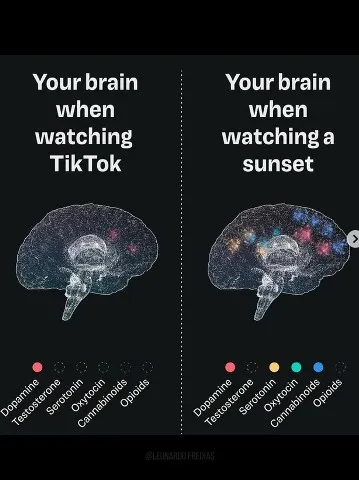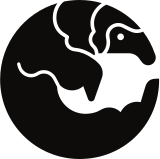Sciences
Cerveau bien et mal stimulé (en anglais)
Le post
Voir sur
Your brain makes decisions before you realize it.
And your daily habits are programming these decisions.
I've studied the psychology of decision-making for years.
What I found changed how I view technology:
40% of what we do each day is habit, not active decisions (Research from Duke University).
Our automatic brain patterns shape our life more than we realize.
Look at these brain scans. The contrast is eye-opening:
These brain illustrations are inspired by actual fMRI studies done on users of the Matter app, mapping where in our brain positive emotions are generated and how they connect to our feel-good neurotransmitters.
🧠 Scrolling social media mainly triggers dopamine — the same reward chemical activated by gambling.
🧠 Being in nature activates multiple brain chemicals — creating a fuller, more balanced response.
This isn't about saying technology is bad. It's about understanding how your brain works.
Better decisions create better results, and your environment shapes your decisions.
7 simple ways to rewire your brain for better choices:
1. Control your dopamine
↳ Set specific times for social media instead of random checking.
↳ Your brain needs breaks between reward hits.
2. Design your attention space
↳ Turn off most notifications except from real people.
↳ Set up your workspace to cut distractions.
3. Use your morning brain wisely
↳ The first hour after waking sets your brain's pattern for the day. (Research from the Journal of Neurophysiology on cortisol awakening response)
↳ Stay off screens during this important time.
4. Seek richer experiences
↳ Activities that trigger multiple brain chemicals create deeper satisfaction.
↳ Real conversations and time in nature do this naturally.
5. Create clear boundaries
↳ Make distinct separations between work and personal screen time.
↳ Even short screen breaks can reset your focus.
6. Question your assumptions
↳ Your brain loves shortcuts that confirm what you already believe.
↳ Deliberately expose yourself to different perspectives.
7. Build in recovery time
↳ Your brain needs quiet periods to process information.
↳ Put devices away at least an hour before bed.
We obsess over optimizing our businesses, our calendars, and our workflows, but rarely think about optimizing the operating system that runs it all — our brain.
Your environment isn't just where you work.
It's what's programming your mind.
Design it intentionally.
What's one change you've made to your daily habits that improved your thinking? Share in the comments below ⬇️
♻️ Repost to help your network make better decisions.
And Follow Jyoti Patel for more.
- - - -
📌 Get instant access to free PDF's by subscribing to my newsletter Mindset & Methods: jyotipatel.me
Image credit: @matterneuroscience

Le débunk
Way too vague! 🤔
Matter (https://matter.xyz/) offers an app designed to help people "feel good" However, no peer-reviewed studies scientifically validate their mapping of neurotransmitters responsible for human happiness.
Moreover, their app relies on self-assessment, with no evidence that it actually measures well-being.
Finally, their entire approach is based on a "universal model" of happiness, ignoring individual diversity.
Regarding the post, some shortcuts lead to inaccuracies:
Associating screens with "scrolling" is misleading: their impact on well-being is hard to demonstrate and depends on many factors (e.g., in children https://cvc.li/Hmsuw, through loneliness https://cvc.li/HaivB).
"Well-being hormones" do not simply "trigger". Here, dopamine, serotonin, and oxytocin are neurotransmitters, they are messengers. (https://cvc.li/DfNLr).
Functional MRI does not measure neurotransmitter activity but rather blood flow variations, which do not directly reflect biochemical neurotransmitter activity (https://urlr.me/eC7pjN).
Sharing information is great, but avoiding the authority bias is even better! 🙂
Vous avez une question, une remarque ou une suggestion ? Contactez-nous en en indiquant le titre du débunk. Nous vous répondrons au plus vite !
Contactez-nous
